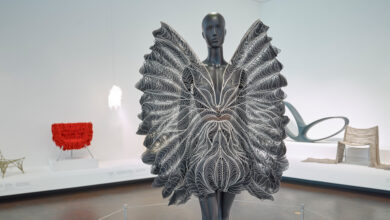
Refusing to Hide
‘Anne Frank’ hits home for out actor, director.
By Donalevan Maines
If Mr. Düssel seems a little “light in his loafers” in Queensbury Theatre’s production of The Diary of Anne Frank, it’s because veteran out thespian Ron Jones plays him that way. “The script never says he’s gay, but I just have an inkling he was,” explains Jones. “I play him a little fey.”
Mr. Düssel is the German dentist whose character squeezes into an Amsterdam attic with two Jewish families who are hiding from the Nazis in Wendy Kesselman’s new adaptation of the Holocaust theater classic, which is based on the autobiographical book The Diary of a Young Girl by Anne Frank.
Although Mr. Düssel is married to a Catholic woman, Jones feels his instincts were confirmed prior to rehearsal when he read a magazine article about a closeted Jewish husband and his wife who fled Poland to escape Nazi persecution. “When they got to America, the man told his wife he was gay and had been having sex with men their entire marriage. But he was in love with her and she was in love with him, so they stayed married for 65 years.”
The Queensbury production is directed by L. Robert Westeen, whose friends call him “Lonnie.” He and his husband, Jase, were married on the theater’s main stage on October 3, 2015. “Now that I am playwright-in-residence for Queensbury Theatre and also directing at the theater, I am constantly reminded of our special day and everyone who was a part of that day,” he says.
The play itself hits home with Westeen in “multiple ways,” he says. “One, the aspect of hiding, which is the most obvious,” Westeen says. “There’s a point where we as gay men are all hiding, fearing the outside world and the repercussions that would come from coming out. Would we become outcasts? Hated? Something less than human, in the eyes of those we love and society? Two, as gay men we have a part in the Holocaust, right along with the Frank family. We were persecuted, killed, and experimented on. The Nazis thought homosexuality was a disease that could be cured with humiliation and hard work. They prosecuted gay men under Paragraph 175 of the German Criminal Code. The Holocaust is where the symbol of the pink triangle comes from. It was our Star of David attached to our clothing in the concentration camps.”
Jones doesn’t exactly feel his director’s pain when it comes to “hiding” as a gay man. “I have never felt ostracized,” he explains. “I taught for 36 years, in public school and college, and never had a single problem. The same thing in my personal life—my friends and family have always been tremendously supportive. I guess I’ve just been lucky. I’m proud of who I am. I don’t introduce myself as, ‘Hello, I’m gay,’ but if someone asks, I say, ‘What planet are you from?’”
Jones also declined to go into hiding last year when he was diagnosed with cancer and had to undergo six months of chemotherapy. “It hit me pretty hard. I was weak, tired, and sometimes sick and nauseous, but I told my doctor, ‘I don’t want to be a recluse for six months,’” he explains. “He told me to go out and do things that make me happy, so I directed Whistle Down the Wind with 54 actors and 31 children.” (The rarely performed Andrew Lloyd Webber musical played last fall as the first fully professional production at Queensbury Theatre, formerly a community theater called Country Playhouse. Its new name was unveiled in 2015 along with a $7 million multi-level, 21,000-square-foot theater near City Centre in west Houston.)
Next, Jones lured beloved Houston actress Marietta Marich out of retirement to play opposite her daughter, Allison Marich, under his direction in John Patrick Shanley’s Outside Mullingar at Queensbury. “At first she told me no, because she didn’t think she could remember lines. I told her, ‘You said that 10 years ago. You’re doing this,’” he recalls. Marich had made her last stage appearance in 1996, in the musical James Joyce’s The Dead, which Jones directed at Main Street Theater.
Jones says he worried that his cancer treatments might affect his ability to memorize lines, so he turned down a leading role in favor of playing Mr. Düssel.
The original dramatization Anne Frank, by Frances Goodrich and Albert Hackett, was awarded the Pulitzer Prize for Drama in 1956, and the production won the Tony Award for Best Play.
The 1959 film version, with the late Ed Wynn as Mr. Düssel, won three Academy Awards, including the first of two Oscars for Shelley Winters as Best Supporting Actress. That Oscar statuette is on display at the Anne Frank House in Amsterdam.
Queensbury and the production team are working closely with the Holocaust Museum Houston as an educational resource, planning joint events that will coincide with the run of the play.
What: The Diary of Anne Frank
When: May 5–20
Where: Queensbury Theatre, 12777 Queensbury Lane
Details: queensburytheatre.org or 713.467.4497










